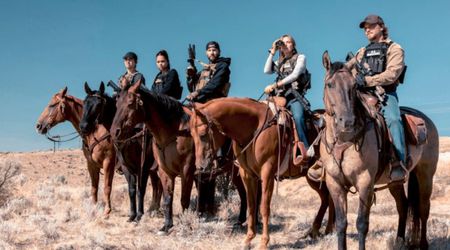'Taste the Nation' explores the cruel atrocities of the 'Trail of Tears' and the 'Long Walk of the Navajo'

Spoilers for 'Taste the Nation' with Padma Lakshmi
Hulu's 'Taste the Nation' is a series that seeks the soul of various immigrant foods as we learn about embedded history in meals that can never be forgotten. In one of the episodes titled 'The Original Americans', we are taken to the crux of what the original American cuisine consisted of, and through that journey, Padma exposes us to facts about the cruelty towards the Indigenous people years ago.
With the breezy warm location of Phoenix, Arizona as the backdrop, the episode explores how Native Americans want to preserve their future by not letting their connection with their past die. In the 30-minute episode, we meet Andi Murphy, a Navajo podcaster who "speaks with Indigenous chefs and farmers about food sovereignty." To explain why the idea of food sovereignty came to be, Padma narrates the origin of a classic Native American food fry bread.
In this narration, we hear about the atrocities against the Native Americans as Padma cites Trail of Tears and the Long Walk of the Navajo as examples. What do both those stories of the past mean?
While fry bread is a classic food of the Native people, it is in fact, not traditional like beans and deer meat, as revealed in the episode. Padma explains food sovereignty to be "freedom from outside control" stating that without independence as such "the Indigenous people could disappear altogether." Murphy revealed that in Native America, access to healthy food is limited and so the community is now focusing on "creating that access and reconnecting" with themselves and their original food - "because it's our food," she says.
Padma's guest further revealed that people who listen to her podcast speak of Native food being connected to their DNA. Here is where Murphy introduced the topic of reservation systems in the late 1800s referring to them as "literally prison camps" Padma's narration revealed the true origin of fry bread, and while to most it is a staple food, it bears a very painful history — the genocide of Native Americans.
In the 1800s there were mass migrations that were violent as European settlers started to force Natives Americans off their ancestral lands and into reservations. The community was stripped off their Native food sources such as vegetables and were instead given "European style rations" to survive. Here is how the 'Fry Bread' came to be - "It is not Indigenous," said Murphy, "it's made from ingredients that were basically forced on us." During the 1800s thousands of Native Americans lost their lives in atrocities such as the Trail of Tears in the east and the Long Walk of the Navajo in the southwest, marking an inherent dark part of American history.

In the 1800's the Cherokee people were forced to leave their lands by the Mississippi River and make their way to what is now Oklahoma. The community referred to their long journey as the "Trail of Tears" because of the suffering they faced during that journey. According to PBS, out of 15,000 people, over 4,000 didn't survive and lost their lives to either, "hunger, disease, or exhaustion."
The Philadelphia Tribute refers to this atrocity as "White America's 'Indian' Holocaust". The forced removal of the Cherokees began in 1830 when President Andrew Jackson signed Senate Bill 102 called 'The Indian Removal Act (IRA) forcing "five Southeastern indigenous nations, including the Cherokee, Chickasaw, Choctaw, Creek, and Seminole, as well as the Fox, Kickapoo, Lenape, Miami, Omaha, Ottawa, Potawatomie, Sauk, Shawnee, and Wyandot , to trek up to 2,200 miles on foot, from as far as Florida to what’s now known as Oklahoma where the government’s newly created so-called Indian Territory was established," as reported by the publication.
The "Long Walk of the Navajo" is also referred to as the Long Walk to Bosque Redondo and in many ways was the Trail of Tears for the Navajo people. An article from NPR reveals that in the 1860's a surplus of 10,000 Navajos and Mescalero Apaches were forced to move and reside in a reservation called Bosque Redondo in eastern New Mexico. Thousands had lost their lives during their journey due to disease and hunger as they were "held captive" by the U.S. Army. The horrid tragedy had almost wiped out the Navajo nation.
The episode brought a well-needed history lesson to a topic that breeds unnecessary controversy since the facts of America's past can't be erased. The Native Americans want independence not only over their land but their food as well. Series that bring back topics that are important such as these allow people to do their research on parts of history they either may have not been taught or may have ignored. Once in a while, it's good to brush up on history, as it is evident that it often repeats itself.
Catch all episodes of 'Taste the Nation With Padma Lakshmi' on June 18 on Hulu.










